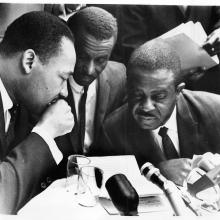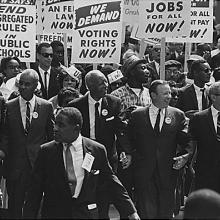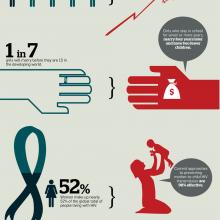50th anniversary
As the nation recognizes the 50th anniversary of Martin Luther King Jr.’s assassination, we are poised at the threshold of a new national movement for racial justice that may or may not prove successful in fulfilling King’s ultimate vision.
WASHINGTON — Fifty years to the day after Martin Luther King, Jr., knocked on the nation’s conscience with his dream, religious leaders gathered in a historic church to remind the nation that he was fueled by faith.
Later, in the shadow of the Lincoln Memorial where King thundered about America’s unmet promises, King’s children joined the likes of President Barack Obama and Oprah Winfrey to rekindle what Obama called a “coalition of conscience.”
At Shiloh Baptist Church, where King preached three years before his 1963 “I Have A Dream” speech, Christian, Jewish, Muslim, and Sikh clergy summoned King’s prophetic spirit to help reignite the religious fires of the civil rights movement.
King’s daughter, the Rev. Bernice A. King, said at the service that her father was a freedom fighter and a civil rights leader, but his essence was something else.
“He was a pastor,” said King, who was 5 when her father electrified the nation in front of the Lincoln Memorial. “He was a prophet. He was a faith leader.”
Editor's Note: The following is a transcript of President Barack Obama's speech from the Lincoln Memorial on the 50th Anniversary of the March on Washington.
We rightly and best remember Dr. King’s soaring oratory that day, how he gave mighty voice to the quiet hopes of millions; how he offered a salvation path for oppressed and oppressors alike. His words belong to the ages, possessing a power and prophecy unmatched in our time.
But we would do well to recall that day itself also belonged to those ordinary people whose names never appeared in the history books, never got on TV. Many had gone to segregated schools and sat at segregated lunch counters. They lived in towns where they couldn’t vote and cities where their votes didn’t matter. They were couples in love who couldn’t marry, soldiers who fought for freedom abroad that they found denied to them at home. They had seen loved ones beaten, and children fire-hosed, and they had every reason to lash out in anger, or resign themselves to a bitter fate.
We’ve spent the last few days recalling the anniversary of the March on Washington and listening again to the Rev. Martin Luther King, Jr., talk so powerfully about his dream of a land that is full of love and free of hatred. Stirring words. Inspiring words. Spirit-infused words. We’re also reminded that they’re only words until they produce action.
It’s one thing to be inspired when we hear something, another thing to respond to the inspiration and to do something.
Powerful words play a big role in our lives, challenging us and leading us. God is love. Love one another. Be compassionate. Love your enemies. Whatsoever you do to the least. Your brother‘s keeper. An instrument of your peace. Give to all. The moral arc of the universe is long, but it bends toward justice. Blessed are the poor. All men are created equal. The common good. Government of, by and for the people. I have a dream. Be the change. Make justice a reality for all God‘s children.
Those and so many other words inspire us to raise our lives and our world to new heights. But they remain words until we commit ourselves to live them. Then they acquire real power.
It may be the most famous speech of the 20th century.
Millions of American schoolchildren who never experienced Jim Crow or whites-only water fountains know the phrase “I have a dream.”
And many American adults can recite from memory certain phrases: the Rev. Martin Luther King Jr.’s use of the prophet Amos’ vision of justice rolling down “like waters and righteousness like a mighty stream,” or the line about children being judged not by “the color of their skin but the content of their character.”
To many in this country, “I have a dream” has a place of honor next to the Declaration of Independence, the Emancipation Proclamation and the Gettysburg Address. It celebrates the lofty ideals of freedom.
But scholars say it would be a mistake to celebrate the speech without also acknowledging its profound critique of American values.
I will march on Saturday because I refuse to allow my two sons to be treated as statistics or a stereotypes rather than as children of God. I will march because overly aggressive policing tactics that overly rely upon racial profiling make a mockery of Dr. King’s dream that every child will be judged by the content of their character and not the color of their skin.
I will march because the recent repeal of section four of the Voting Rights Act by the Supreme Court jeopardizes the voting rights of millions of Americans across the country, particularly in southern states where new barriers to this sacred right are already being erected.
I will march because based on national statistics, my two black boys face a one in three chance of spending some time of their lives behind bars, a disturbing and destructive reality that has been made possible in part by mandatory drug sentencing laws that must be reevaluated and changed.
This August will mark the 50th anniversary of Martin Luther King’s “I Have a Dream” speech, and there will rightly be much remembrance and celebration of its place in American history. But there is another anniversary that our nation, and especially its Christians, would do well to acknowledge, investigate, and ruminate.
Forty-five years ago yesterday, Dr. King arrived in Memphis, Tenn., to support a sanitation workers’ strike seeking to unionize. He was assassinated the next day — the anniversary we today remember — and in a sad irony our nation began the sanitation of his legacy. Indeed, King’s decision to join the Memphis struggle was just one of many acts that clash with what David Sirota calls the “Santa Clausified” image of King that we pass to our youth.
In celebration of its 50th anniversary, Amnesty International has released a new song, "Toast to Freedom," recorded by nearly 50 artists from around the world.
The original tracks for the song were recorded in Levon Helm's famed studio in Woodstock, N.Y., known as "The Barn," where acclaimed artists like the Black Crowes and My Morning Jacket have made recordings and where Helm, a four-time Grammy winner, for years stages his intimate, multi-artist concert performances known as the “Midnight Ramble.” (Helm passed away in April after a long battle with cancer.)
Artists who sing and/or play on the recording includ Kris Kristofferson, Roseanne Cash, Keb Mo, Carly Simon, Marianne Faithful, Donald Fagen (of Steeley Dan), Sunny Landreth, Shawn Mullens, Ewan McGregor (who knew he could sing so nicely?) and the late Mr. Helm himself.
Have a listen to the song and read about the "Electric Burma" concert later this month in Ireland honoring Burmese justice champion Aung San Suu Kyi, where some of the "Toast to Freedom" artists will perform the song live, inside the blog ...
A lot changes in 50 years.
In 1962, people didn’t have the internet, a cell phone, a microwave oven and many probably didn’t yet have a color television set. JFK was president and no one had been to the moon yet. Steve Jobs hadn’t even invented anything yet – he was only 7 years old.
But one thing that remains is USAID. 2012 marks the agency’s 50th anniversary, and its commitment to global political, economic and social development has been sustained since its foundation in 1961.

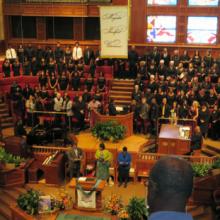
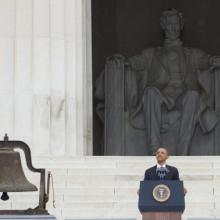
![President Lyndon Johnson and Martin Luther King, Jr. By Yoichi R. Okamoto [Public domain], via Wikimedia Commons By Yoichi R. Okamoto [Public domain], via Wikimedia Commons](https://sojo.net/sites/default/files/styles/medium_square/public/blog/512px-Lyndon_Johnson_and_Martin_Luther_King%2C_Jr._-_Voting_Rights_Act.jpg?itok=z3qvpwpZ)
